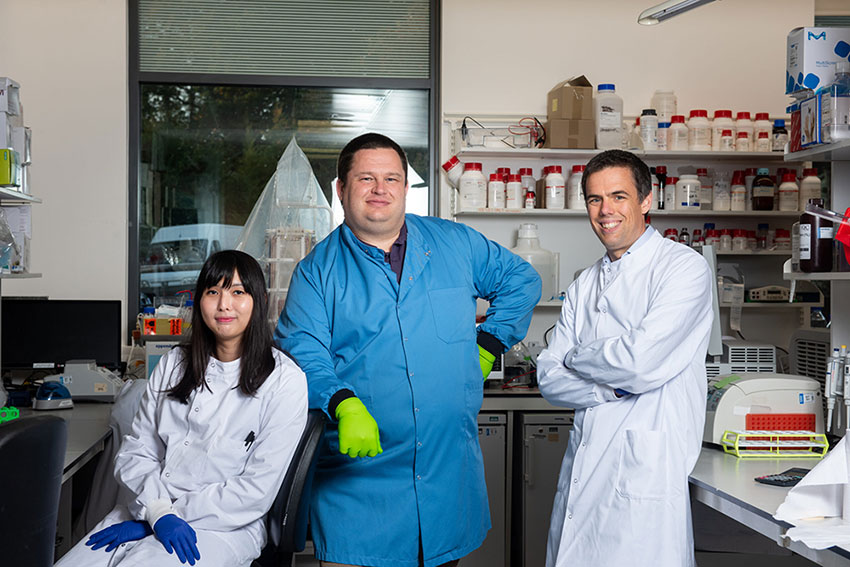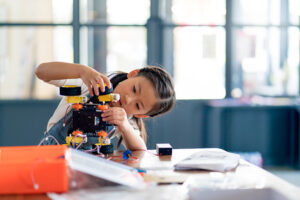From classroom detention regular to creating the AstraZeneca COVID vaccine: How ICAS uncovered a science pioneer flying under his high school radar
- Categories Blog
- Date December 20, 2022

Adam Ritchie (in the middle) and his colleagues at the Jenner Institute in Oxford. PHOTO: John Cairns
When it comes to spotting academic potential, it’s not always obvious from students’ examination results. Julie Carrington, teacher of Senior Chemistry and Junior Science at Sydney Technical High School, calls those who slip through the cracks in standard tests “gifted and talented underachievers.”
To be classed as one, you might be: “a student who has an innate intelligence, but perhaps does not apply themselves to learning the work or the content, and therefore in the exams they might not shine.”
Adam Ritchie, one of Julie’s past students, would certainly agree. If not for his teacher’s watchful eye and encouragement for him to try his hand at the ICAS Science competition in Year 10, he perhaps wouldn’t find himself now a prominent University of Oxford academic, playing a key role in developing the manufacturing process and approach for the Oxford-AstraZeneca COVID-19 vaccine.
It was his chance entry into the competition in 1993 that marked a pivot point in Adam’s future.
An atypical learner who admits he “didn’t put in that much effort”
Adam had come to be a student at Sydney Technical High School, a selective school, after having been previously accepted into an opportunity class in Year 5. His parents had encouraged him and dreamed of a better scholastic future for their son, after themselves not having finished high school, and noticing Adam’s distinctive natural brightness.
The problem was that Adam – as he himself admits – didn’t fit the conventional mould of an academically minded student and often found himself in trouble at school. “I was quite physical,” he says. “I used to get into a little bit of rough and tumble with other boys, and I used to get into a lot of trouble for that sort of thing.” He admits: “I didn’t put in that much effort early on. I think I was just middling until Year 8.”
Adam’s apparent lack of interest in studying kept him below the academic radar until, in Year 8, he took part in a maths competition and received a very high score. So much so that he remembers it being discussed as a bit of an anomaly. “Given my behavioural record, I’m sure they were saying to themselves: I think he got lucky filling in the multiple-choice circles, ” says Adam.
Even so, Julie, who is in her fourth decade of teaching science at the school, had taken note.
From bottom science class to the ICAS “wake-up call”
Julie was a big fan of ICAS tests. These are purpose-designed to recognise academic excellence by assessing students on their ability to apply classroom learning to higher-order thinking and problem-solving, instead of relying on memorising facts. ICAS sits outside of the standard high school examination system, brought in by schools when they want to better understand and support the potential of their students.
“The beauty of ICAS is that it explores a sophisticated way of thinking. And this can often be a wake-up call for the student. And for us in identifying these students,” she says.
“I was called to the deputy principal’s office. I thought: ‘I don't even know what I’ve done this time’. He said to me: ‘What are we supposed to do with you? You got a perfect score in the ICAS Science competition.’ I was speechless.”
Adam Ritchie, Senior Vaccine Programme Manager, Nuffield Department of Medicine, University of Oxford
Adam was in one of the bottom science classes at the time. And while “bottom” at a selective school is by no means unmeritable, Julie felt he had something more to offer that the ICAS questioning style might be able to coax out of him. As it turned out, she was right: Adam achieved 100% in ICAS Science. A perfect score.
He says: “Someone came into the classroom with a slip for me to go to the deputy principal’s office. I thought: I don’t even know what I’ve done this time. Usually when this happened I’d had a fight at lunchtime or done something stupid. He said to me: ‘What are we supposed to do with you? You got a perfect score in the science competition.’ I was speechless.”
From pivot point to upward course through academia, and a doctorate in immunology
Adam’s 100% score cemented Julie’s view on the issue of hidden gifted students: “Many of them are out there and we don’t know. This is what I feel ICAS uncovers,” she says.
Under Julie’s mentorship, Adam was able to direct his energy into his love of problem solving. He says: “Through the Department of Education she got me involved in a mentor program for young people at high school. They paired me up with a graduate student at the University of New South Wales (UNSW) who was studying anthropology. And so, for work experience and then sometimes during my holidays, I’d hang out at the university.”
Ultimately, Adam was accepted into UNSW himself to study biology. Initially interested in palaeontology, he shifted focus towards host pathogen interaction, achieving First Class Honours in his Bachelor of Science in Medical Microbiology and Immunology and then completed a doctorate (Doctor of Philosophy in Immunology).
Next, he went to the University of Oxford to pursue post doctorate research on the impact of disease, including Mad Cow disease, HIV and malaria. Adam spent several years at the Blavatnik School of Government, advising international ambassadors on how to respond to the West-African Ebola outbreak and teaching policy makers what to do in the event of a pandemic: “I once wanted to think about how big things evolve, like mammals and humans and stuff like that. But actually, I’ve ended up at Oxford University exploring how pathogens change instead, and how humans can respond to that.”
Adam went from there to the Jenner Institute, another part of Oxford University, which deals with vaccines. His job? To get vaccines from the lab to the patient where they can save lives. During the pandemic, he worked with colleagues to solve the en-masse manufacturing challenge of the University’s COVID-19 vaccination, so that it could be brought to market by AstraZeneca: “We have our own manufacturing facility that traditionally makes small batches of vaccines, around 100 doses usually. It was they who made the first-ever doses of the Oxford vaccine now known as AstraZeneca. But we knew that if the vaccine worked, we would need millions or billions of doses very quickly”
Making history with Oxford vaccine recipe as COVID-19 grips the world
When the pandemic really took hold, Adam’s team realised it needed to start manufacturing the COVID-19 vaccine faster and at a larger scale. With millions of lives in their hands, they would have three meals a day at their desks: “I’d often go to bed at two in the morning, and be up at six,” he says.
“We’d been making the vaccine in the lab in tiny little vials of 20 or 30 doses at a time. But down in Portsmouth, there was a facility that could make 200 litre runs of hundreds of thousands of doses at once,” Adam says.
“Nearby manufacturing labs were locked down, so I drove with my assistant sitting in the backseat, holding living cells that the virus vaccine grows in – a big flask of cells and an alarm that went off every two minutes. At each alarm she would have to rotate the flask to keep the cells happy.”
Adam Ritchie
Lots of facilities were locked down and Adam had to drive the non-medical-grade vaccine and cell seeds from Oxford to Portsmouth to speed up the development process. “We’d been making the vaccine in the lab in small batches of a few litres at a time. But down in Portsmouth, there was a facility that could make 50 or 200 litre batches. If the process scaled up, this might represent hundreds of thousands or even over a million doses,” Adam says.
“I couldn’t give this to a courier, it was too important. So, I drove with my assistant sitting on the backseat of my car holding living cells that the virus vaccine grows in. Sending frozen cells would have added two weeks to the development process in Portsmouth. She sat on the backseat of my car with a big flask of cells and an alarm that went off every two minutes. At each alarm she would swirl the flask to shake the cells and keep them happy,” he says.
Next, Adam’s team at the University solved the problem of preventing any one country from keeping all the vaccines. “We came up with this thing called distributed manufacturing, at the start we had five different manufacturing sites in India, China, the Netherlands, and two in the UK. When AstraZeneca joined the programme after a few months, they expanded this further to over a dozen sights across five continents” Adam says. “It’s things like this that I enjoy, as they put my problem-solving skills to work and ensure academic research has real-world impact.”
Advice for today’s learners
Reflecting on his path, Adam recognises the significance of having had the opportunity to show what he could do in his own way: “My wife is a true academic, a full professor at Oxford. She thinks deeply about research, while I think in terms of how to translate that research into impact. And I guess those are the kinds of different abilities the ICAS tests point to, back at school age.”
His role at the university also encompasses admissions and undergraduate teaching. “When I talk to my Oxford undergraduates about what matters, I tell them rote learning is a thing people get addicted to. And what I always say to them is: ‘If as your boss, I can Google the answer to something, you’re of no value to me. But if I give you a complex question and you can work out how to answer it, that’s valuable.’”
Adam feels the secret to effective student assessment is to “not have it so narrow in scope that you just end up with the same student over and over again.”
Adam and Julie are still in contact with each other, and Julie couldn’t be prouder of what her one-time student continues to achieve. “ICAS is a once in a lifetime opportunity to uncover someone amazing,” she says.
Interested in participating in ICAS this year? Check out the ICAS 2023 subject dates here.
Tag:Case study
You may also like

5 practical tips on how to be successful at ICAS Writing

5 proven tips for getting a great result for ICAS Science

